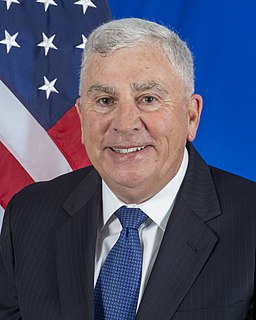A Quote by Theodore Kaczynski
Power depends ultimately on physical force. By teaching people that violence is wrong (except, of course, when the system itself uses violence via the police or the military), the system maintains its monopoly on physical force and thus keeps all power in its own hands.
Related Quotes
Some people draw a comforting distinction between force and violence. I refuse to cloud the issue by such word-play. The power which establishes a state is violence; the power which maintains it is violence; the power which eventually overthrows it is violence. Call an elephant a rabbit only if it gives you comfort to feel that you are about to be trampled to death by a rabbit.
Non-violence is backed by the theory of soul-force in which suffering is courted in the hope of ultimately winning over the opponent. But what happens when such an attempt fail to achieve the object? It is here that soul-force has to be combined with physical force so as not to remain at the mercy of tyrannical and ruthless enemy.
No individual or private group or private organization has the legal power to initiate the use of physical force against other individuals or groups and to compel them to act against their own voluntary choice. Only a government holds that power. The nature of governmental action is: coercive action. The nature of political power is: the power to force obedience under threat of physical injury-the threat of property expropriation, imprisonment, or death.
We must realize that violence is not confined to physical violence. Fear is violence, caste discrimination is violence, exploitation of others, however subtle, is violence, segregation is violence, thinking ill of others and condemning others are violence. In order to reduce individual acts of physical violence, we must work to eliminate violence at all levels, mental, verbal, personal, and social, including violence to animals, plants, and all other forms of life.
We have power... Our power isn’t in a political system, or a religious system, or in an economic system, or in a military system; these are authoritarian systems... they have power... but it’s not reality. The power of our intelligence, individually or collectively IS the power; this is the power that any industrial ruling class truly fears: clear coherent human beings.
Power invariably elects to go into the hands of the strong. That strength may be physical or of the heart or, if we do not fight shy of the word, of the spirit. Strength of the heart connotes soul-force. Let it be remembered that physical force is transitory, even as the body is transitory. But the power of spirit is permanent even as the spirit is everlasting.
The use of violence in our struggle would be both impractical and immoral. To meet hate with retaliatory hate would do nothing but intensify the existence of evil in the universe. Hate begets hate; violence begets violence; toughness begets a greater toughness. We must meet the forces of hate with the power of love; we must meet physical force with soul force. Our aim must never be to defeat or humiliate the white man, but to win his friendship and understanding.
Here we observe the basic obsessive fantasy of Žižek's position: do nothing, sit still, prefer not to, like Melville's Bartleby, and silently dream of a ruthless violence, a consolidation of state power into one man's hands, an act of brutal physical force of which you are the object or the subject or both at once.
I do believe that where there is a choice between cowardice and non-violence I would advise violence. Thus when my eldest son asked me what he should have done, had he been present when I was almost fatally assaulted in 1908, whether he should have run away and seen me killed or whether he should have used his physical force which he could and wanted to use, and defended me, I told him that it was his duty to defend me even by using violence.
My approach to violence is that if it's pertinent, if that's the kind of movie you're making, then it has a purposeI think there's a natural system in your own head about how much violence the scene warrants. It's not an intellectual process, it's an instinctive process. I like to think it's not violence for the sake of violence and in this particular film, it's actually violence for the annihilation of violence.
Government force is derived from the sum of the physical force each citizen could exert which by one citizen himself would be ineffective, but when summed from the force of all the area's citizens indeed composes a power no citizen or group can withstand. That force is then rightly but justly to be used against those who violate the foundation pillars of freedom.





































